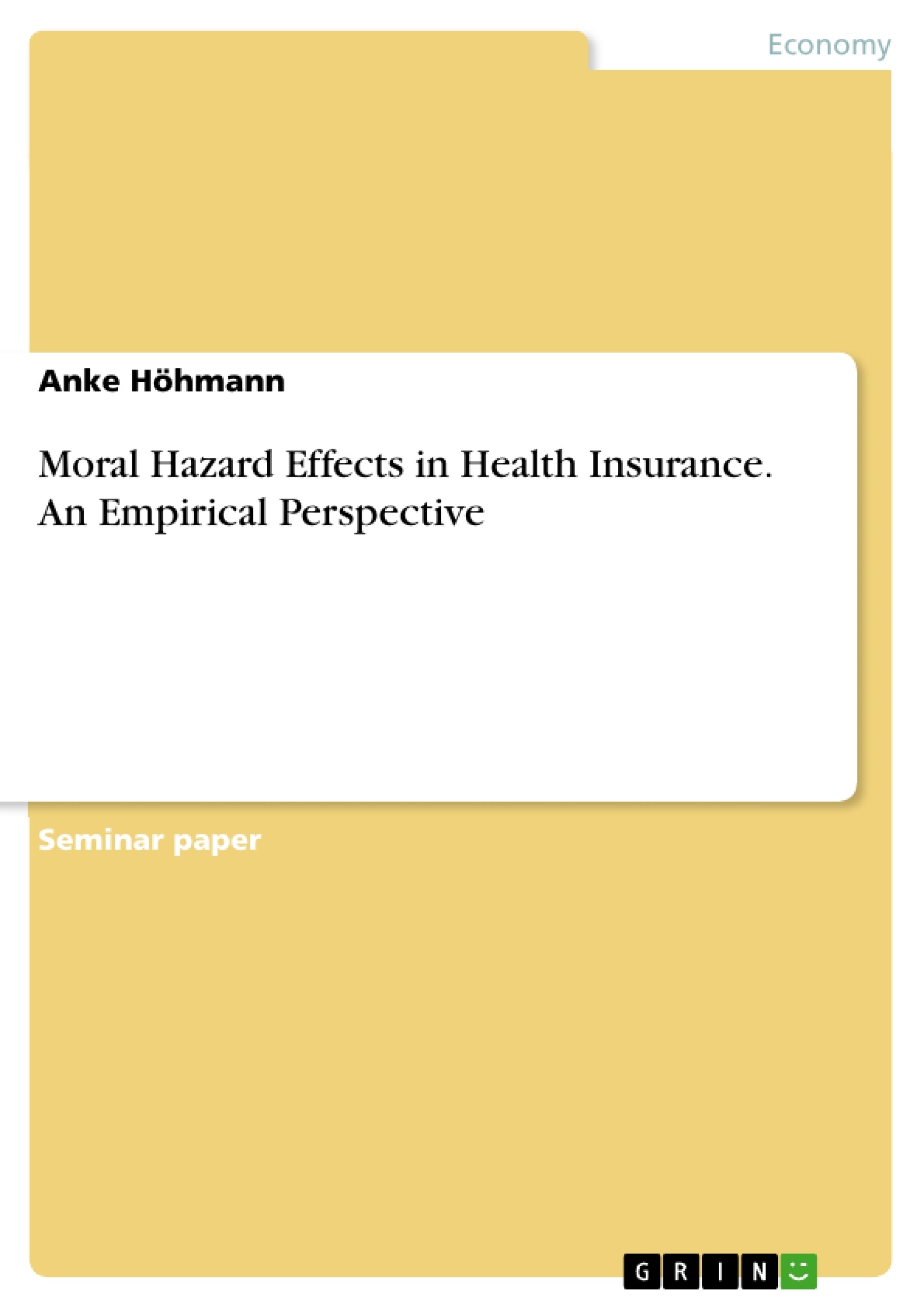In the discussion about cost increase for German health care, the existence of a moral hazard problem is often mentioned. A bigger part of the costs are ascribed to the insured persons´ behavior or lifestyle. The insured person is led to an increased demand of medical services than without an insurance. But also doctors or pharmacists may be evidenced „unethical“ behavior on the part of supply-induced demand. Is it really an unethical or rather a rational behavior? Which experiences have been made with a higher self-participation of the insured people? In which context stay health care services and price elasticity? And how can you reduce the problem of moral hazard? These are just a few questions which will be examined in this paper.
The first chapter begins with health insurance in general and explains the benefits and the risks of being insured. The second chapter gives a generally valid definition of moral hazard as well as in terms of health insurance in particular. The third chapter shows the empirical perspective from the point of view of insured people and doctors. Thereby, it will enlarge on the RAND experiment and the price elasticity in the German market. The fourth chapter gives a few solutions for moral hazard effects, whereby solutions for insured people and for alternative financing are here in the focus. The last chapter will give a conclusion to the discussed topic.
Table of Contents
- Introduction
- Health insurance
- Moral hazard
- Moral hazard general
- Moral hazard in health insurance
- Empirical perspective
- Price elasticity for health services in the German market
- Health care providers and the external moral hazard
- Solutions of moral hazard effects
- By the insured persons
- Medical Savings Accounts
- Conclusion
Objectives and Key Themes
This seminar paper analyzes the concept of moral hazard in health insurance, focusing on an empirical perspective. It explores the theoretical framework of moral hazard, particularly in the context of health insurance, and examines real-world implications and potential solutions.
- The nature and implications of moral hazard in health insurance
- Empirical evidence of moral hazard in health insurance markets
- The role of price elasticity in health service utilization
- Potential solutions to mitigate moral hazard effects
- The influence of health care providers on moral hazard
Chapter Summaries
- Introduction: This chapter provides a brief overview of the research topic, introducing the concept of moral hazard in health insurance and outlining the main objectives of the paper.
- Health insurance: This chapter explores the concept of health insurance, discussing its different forms, mechanisms, and objectives.
- Moral hazard: This chapter delves into the theoretical framework of moral hazard, defining its characteristics and examining its implications in various contexts, specifically focusing on its relevance in health insurance.
- Empirical perspective: This chapter analyzes empirical evidence related to moral hazard in health insurance. It examines the price elasticity of demand for health services in the German market, analyzes the impact of health care providers on moral hazard, and explores the role of the RAND Health Insurance Experiment.
- Solutions of moral hazard effects: This chapter discusses potential solutions to mitigate the negative effects of moral hazard in health insurance. It explores measures undertaken by insured persons and analyzes the role of Medical Savings Accounts.
Keywords
The main keywords and focus topics of this seminar paper include moral hazard, health insurance, price elasticity, health services, demand, supply, empirical evidence, RAND Health Insurance Experiment, Medical Savings Accounts, health care providers, and solutions to mitigate moral hazard effects. These terms encapsulate the core concepts and research focus of the paper, highlighting the central themes of the analysis.
Frequently Asked Questions
What is moral hazard in health insurance?
Moral hazard refers to the tendency of insured individuals to demand more medical services than they would if they were not insured, potentially increasing overall costs.
What was the significance of the RAND Health Insurance Experiment?
The RAND experiment provided empirical evidence on how different levels of cost-sharing affect the demand for health services and health outcomes.
How do health care providers influence moral hazard?
Providers can contribute through supply-induced demand, where they recommend more services than necessary because the patient is insured.
What are potential solutions to mitigate moral hazard?
Common solutions include higher self-participation (deductibles, co-payments) and the implementation of Medical Savings Accounts.
Is moral hazard considered unethical behavior?
While sometimes described as "unethical," many economists view it as rational behavior by individuals responding to the incentives created by insurance coverage.
- Quote paper
- Anke Höhmann (Author), 2016, Moral Hazard Effects in Health Insurance. An Empirical Perspective, Munich, GRIN Verlag, https://www.grin.com/document/367889



